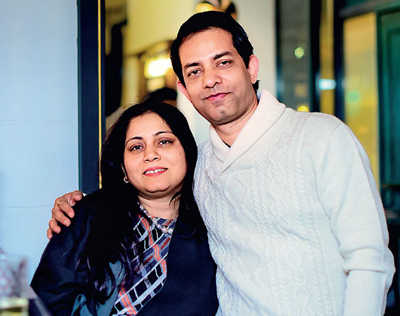By Anindita Paul
If you are a couple who often fights over financial issues, here are some tips that will ensure you are on the same page as your partner
Most couples avoid talking about money unless they’re fighting about it. A 2017 study by financial education firm Ramsey Solutions found money squabbles to be the second-leading cause of divorce in the US. Interestingly, the study also found that couples who claimed to have a great relationship tended to discuss money more frequently than those whose marriage was going through a bumpy patch. Life coach Nidhika Bahl doesn’t find the results of the study, or the fact that money can become a sore point between couples surprising. “When and what you spend money on reveals critical things about your values and priorities,” she says. “For example, someone who values safety and security may want to maintain their savings account at a certain level, stick to a budget, and avoid excessive debt. On the other hand, people who value freedom and excitement may throw caution to the winds as far as expenses are concerned and are likely to spend more recklessly.” She also adds that the biggest reason why many couples find it so difficult to discuss money matters is because each partner has different ideas about what is important to them and what they want to do with their money. Here are some strategies that will help you be on the same page as your partner when it comes to finances.
Make a spending plan
A spending plan can help you plan your day-to-day expenses, while also giving you more clarity about your contribution to household funds. “Agree on a set time to discuss one topic at a time. Start with something routine, such as how to utilise your bank accounts to better organise household bill payments, spending money, and savings. Jointly establish a budget. Consider setting up separate bank accounts for, among other things, short- and long-term savings if you are not comfortable with joint accounts,” says Bahl. To keep these conversations objective and stress-free, she advises focusing on what you can do, instead of what you can’t. Also limit the time and the topic of your discussion so that you can focus on solutions. “Money management isn’t about being perfect,” Bahl adds. “It’s about doing your best and making adjustments as you move along. Draw on each other’s strengths and start with the things you can agree on,” she says.
Get out of debt
Debt can cause a lot of strain in your relationship with your significant other. In fact, the more the debt, the higher the likelihood of the couple fighting. “Start by figuring out how much debt you have, and whom you owe money to. Also determine how much of your monthly income will be needed to cover the minimum payments on each credit line. This will show you how much you absolutely have to set aside to keep your bills current,” says Bahl. The next step is to single out the lines of credit that have the highest interest rates as well as those that you have had the longest. Eliminating these first will save you a substantial amount of money. “Spend any extra money you have towards paying off these lines of credit, in addition to your minimum payment. This will let you pay off your debt faster and, therefore, you spend less money on interest. Many people don’t realise the importance of this simple step when it comes to getting out of debt,” says Bahl.
You could also investigate banks and/or credit unions that are willing to extend one loan at a lower interest rate, which you can use towards paying off balances with higher interest rates. “Your ultimate focus should be on reducing your balances as quickly as possible. Merely paying the minimum amounts is not going to help you to achieve your goals quickly. You’ll also need to be disciplined and not apply for any new credit while you’re working through your debt reduction plan. This also means not charging new purchases to credit,” she says.
Plan your investments
The four pillars of Snehanshu Mandal’s family investment plan are term plans for both spouses, comprehensive medical insurance, ELSS investments as mandated by the government, and a certain amount set aside for aggressive risk-taking investments. “While investments are important, these should not be at the cost of your present standard of living. Ensure you also set aside a realistic sum to meet your daily expenses,” says the 44-year-old IT professional. CA Dilkhush Shah adds, “We plan our financial goals as a family and bifurcate these into short and long-term goals. While saving is good hygiene, saved money will grow only when it is invested properly. The basic principle of investing is to start as early as possible, even with small amounts. Also, be consistent because it is only then that you can reap the benefits of compounding. Diversification is one of the most important aspects of investing.”
Divide responsibilities
“Understand and acknowledge each other’s strengths so that you can divide responsibilities accordingly. This ensures that neither partner feels burdened or stressed by money matters. While it is important for both partners to agree on the financial roadmap, the onus of fulfilling the role should lie with one. For instance, if your wife is responsible for earning a major chunk of the family’s income, you can take over the task of managing investments, cash flows and payments,” says Vishal Anand, founder of Farzi Café.

Vishal Anand and Anuja Sinha believe that couples must understand and acknowledge each other’s strengths so financial responsibilities can be divided equally between them
Use financial tools
When saving for your short and long-term goals as a couple, financial advisor Vishwanath Subramanian advises exploring the following resources:
1 SIPs in mutual funds. You can use these to set aside a monthly contribution to meet particular financial goals. For example, if you are planning to spend Rs 5 lakh on a vacation abroad, you could invest Rs 20,000 per month at 12 per cent to yield Rs 5.1 lakh. Mutual fund SIPs are ideal for financial goals with a threefive-year horizon, says Subramanian.
2 ULIP – this is your best option when saving for your children’s higher education as it offers cost and tax advantages in the longer term, Subramanian says. Contributions of up to Rs 1.5 lakh per year can be claimed under tax benefits, while the maturity benefits are tax-free. You could also use a children’s education planning calculator (available online) to know how much money you will need.
Additionally, couples should look into maintaining a recurring deposit, to accumulate six months to one year’s income, to deal with any emergencies, he says.
Resolve conflicts
When it comes to arguments about finances, Shah believes in being objective. “My wife and I write down the pros and cons of our views, and sit together to compare both our lists. The strategy that scores higher is subsequently followed. However, for major financial decisions, we don’t hesitate to seek the help of qualified professionals”. Mandal adds, “Never take major financial decisions in the heat of the moment. In case of conflict, give each other enough time to calm down before discussing the matter with more clarity.”



